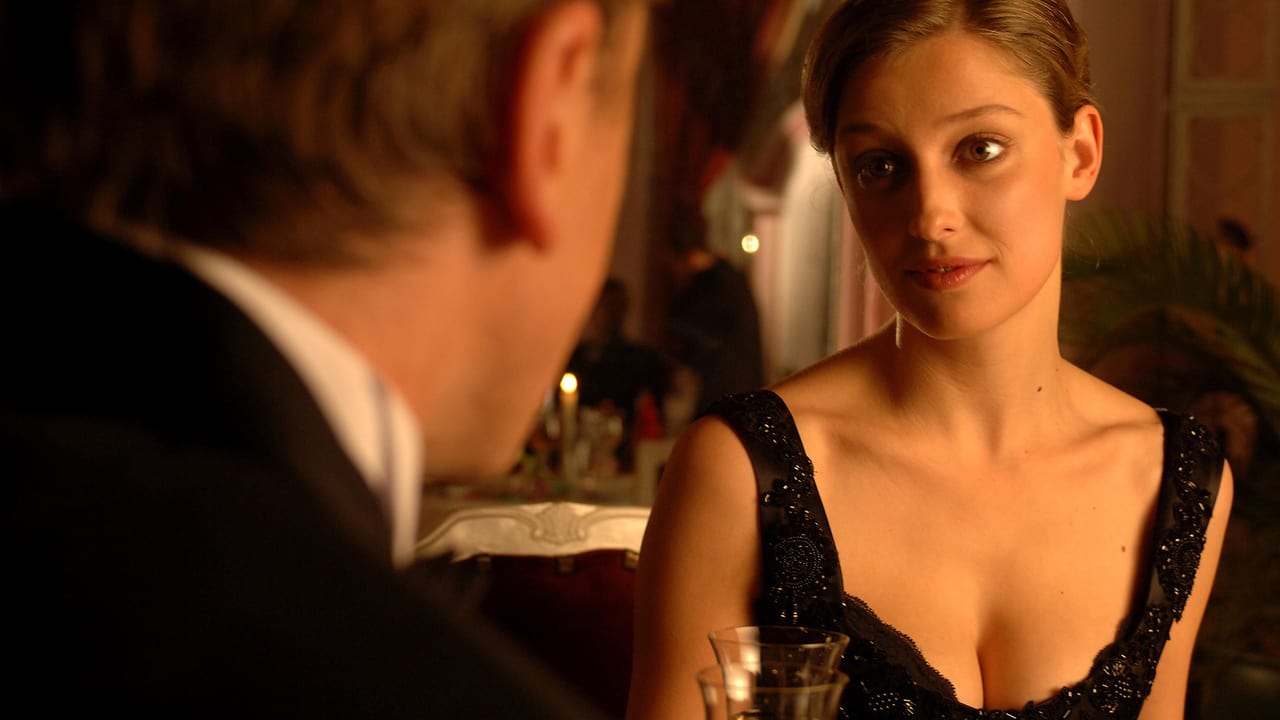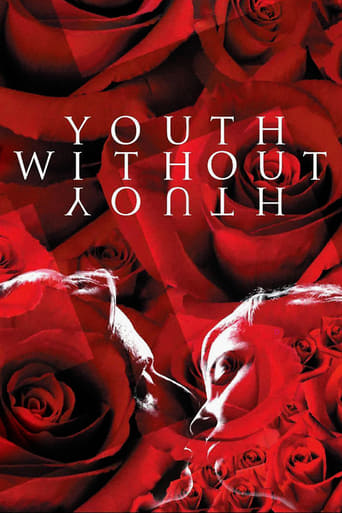



Truly Dreadful Film
Your blood may run cold, but you now find yourself pinioned to the story.
View MoreOk... Let's be honest. It cannot be the best movie but is quite enjoyable. The movie has the potential to develop a great plot for future movies
View MoreThere is definitely an excellent idea hidden in the background of the film. Unfortunately, it's difficult to find it.
View MoreThis is an intriguing pleasant movie which takes you through several stages of suspension of disbelief and then leaves you with "in the end it was all a dream?"However, I can guess that the book format would fit more with the philosophical aspects of it. You can see that a lot of big philosophical questions are approached by the mechanics of doubling your personality through multiple consciousnesses, then mixed with Orientalism and soul transfers... even some telekinesis... in short, it's a bit of a mess. Still pleasant to watch, but you get the feeling that there would be a deeper message or at least more development into the various teams, but instead we have more like a short safari through various aspects of these beliefs.The love story part of it is also not particularly interesting - it offers, for no reason, a duality between work and love. The love is the sort that is automatic and axiomatic - the work is seen as very interesting but we only know it's about the origin of languages and, purportedly, their evolution into something post modern languages. Guessing that since it doesn't really exist (if it ever will) limits recounting anything about the future, but the past analysis is also not particularly developed.So, pleasant watch, but nothing to get particularly excited or introspective.
View MoreLet me start by confirming I am big fan of art-house cinema and generally ignore most of the crap at the multiplex. So this film should be for me according to a lot of these reviews? Except it is flabbergastingly pretentious and frankly totally boring. Just some of the many clichés:Long rambling dialogue containing cod philosophy that is difficult to absorb in one sitting - check! Confusing time sequencing intended to disorientate - check! 'Righteous' battle to elude Nazis - check! Several sections spoken in different languages (including Sanskrit!?) - check! Ridiculous unnecessary shots such as the one of Roth face down in the bath or any number of the 'upside down' sequences - check!I could go on with many more but why keep hammering the point. And that's essentially where this film falls down - yes, if you watched it 5 or 10 times you'd probably see something deeper in it. But it's so laborious I found myself wondering why I bothered sitting through it all once let alone multiple times!There is, admittedly, some beautiful cinematography - especially of the landscapes - but unless you think the concepts that 'growing old is scary' and that 'you may end up at 70 wishing/dreaming you had regained your youth/had more time' are "revolutionary", I doubt you're going to find much in this two hours of incoherence.
View MoreThis is just another failure from Francias Ford Coppola, director from classic like "The Godfather" and "Apocalypse Now", which have been involved in many bad projects like "Jack" or this one. It's rare to see such a gifted director stumble so badly. Coppola badly wants to say deeply meaningful things about life and love. Instead, his film ends up a jumbled mess of romance, Twilight Zone-type science fiction/horror, ancient mystery, pseudo-intellectual theorizing, bad camera angles, and a few unimaginative lightning effects. While this movie starts being somewhat interesting, it quickly turns into a boring, endless mess where nothing has sense at all. And to get it worse, it is made in the most tedious, monotone way that somebody could think. There are scenes that don't make sense at all and that are completely irrelevant to the main plot of the movie.Just like "One From the heart" this is one of the most personal projects from Coppola, but also one of the most flawed and uninteresting as well.
View MoreA note first on style, to me, Youth Without Youth, is one of the most gorgeous modern films, it's one of the few films where the production team are exerting control to the extent when they can be described as using a palette. In this case the colours orange and blue predominate beautifully. There has been some suggestion in modern criticism, particularly in Sight & Sound, that "orange & teal" is a ugly fad that no-one will miss, I think Youth Without Youth is definitely deserving of special treatment. Certainly the blue here is less dingy than elsewhere in the "orange & teal" canon. The film is about a once brilliantly gifted scholar, Dominik Mattei (played by Tim Roth), who appears to have wasted his life, and is now an old man, when suddenly he gets a second chance and returns to youth. The film is interesting, how did he waste his life? Is it because he didn't complete his life's work, a great book which was to contain a grand unifying theory on consciousness and the origins of language, or because he didn't pay enough attention to his beloved Laura?There are two main points of interest in the film for me, one relates to the allure of the situation Mattei is in and the dilemma it presents, and the other to the structure. As a teenager I read Daniel Keyes' 1959 novella Flowers For Algernon, which, in two different forms, has the rare prestige of having won both of science fiction's key writing awards, the Hugo and the Nebula. It's about an experiment performed on Charlie, a man with a very low IQ, who as a result of the experiment, progressively becomes the most intelligent man alive. At one point he criticises the scientist who performs the experiment, mentioning that the best rebuttal of his theories yet written has come from India. The scientist says he has not ever heard of the document which he discovers was written in Hindustani, and which he was therefore not in the position to read anyway. Charlie records, "I asked Dr. Strauss how Nemur could refute Rahajamati's attack on his method and results if Nemur couldn't even read them in the first place. That strange look on Dr. Strauss' face can mean only one of two things. Either he doesn't want to tell Nemur what they're saying in India, or else - and this worries me - Dr. Strauss doesn't know either."One key point of Flowers For Algernon, and also this film, is the allure of supernatural intelligence: what would our thoughts be if we had IQs in the thousands and could read books at a glance? The key tone of the Flowers is sadness, as we find that Charlie's new found faculties are temporary in nature and subside gradually. This tone dovetails with the film as well, because another of the key features of both artworks is the conflict between intellect and emotion. Is it more important to love, or to embrace aloof intellectual pursuits? My slanter tells you all you need to know about my position! In any case it's a very sad story, and I believe that is the heart of Youth Without Youth as well, it's an elegy.The parts of the film where senile Mattei is shown are very poignant and remind me of Mr Blank from Paul Auster's book Travels in the Scriptorium. Both men are vaguely aware of their past mistakes, and also both men are utterly alienated. A kind of tender nastiness pervades these bits if that isn't too oxymoronic. Francis Ford Coppola has mentioned his identification with Mattei, particularly regarding his failure to complete his sci-fi project Megalopolis.My other point concerns the structure. There's a passage towards the end where the Mattei describes an oriental tale of a dream where a prince dreams that he is a butterfly which dreams it is a prince, who dreams he was a butterfly (et cetera). It's not clear in this film just which parts are dreamt, and which not, or whether that matters. It's more that the overall aesthetic conception of Mattei's story of the prince and the butterfly is what matters. In this sense it is similar to the Saragossa Manuscript or the 1001 Arabian Nights, where it is, to a large extent, the structure itself that intoxicates.There is also the issue of familiar to readers of Watchmen, of whether demi-god powers should be used for good or evil (whether indeed it is right to interfere in human destiny at all), or whether they should be directed internally towards solipsism. This makes Roth is well cast, he is a typecast baddie, and this aura of badness here allows this ambiguity to take root. The film also sounds wonderful, and this is mainly due to the ethereal tone of the cymbalom. If you liked Tim Roth in this film I suggest you watch another movie in which he stars, The Legend of 1900 directed by Giuseppe Tornatore, which is also wonderful in a similar enigmatic way.And this review is dedicated to Claire, who is the first rose.
View More